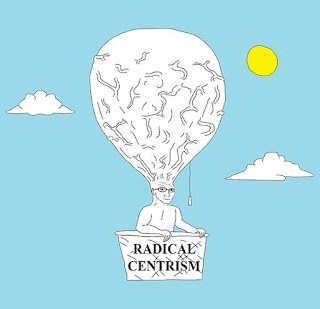Finally -- I've found my political home.
Finally -- I've found my political home -- a tolerant smile at the recognition that we are human, all too human. Too bad it doesn't exist in American politics that I can see!
I just read this excellent article: Centrism: A Moderate Manifesto from the online journal Quillette
It resonated with me completely. It described my political philosophy and worldview perfectly. The only problem is that this particular political philosophy/viewpoint/practice is almost entirely absent in American politics -- and I would say has been for some time. I'd even say it's lack caused the election of Donald Trump (but we could debate that).
When are all of us in the center -- and I know there are a lot of us that meet this definition -- going to rise up and take politics and political discourse back. And if we want to how in the world do we do so. I've been trying to do it by not backing down in discussions, by sharing my views bravely -- even though I was called "evil" at least once. I don't seek discussions out -- in fact I've been avoiding them lately, but when I find myself in one I do try to be true to myself.
It's a longish article, but well worth your time. In case you don't want to read the whole thing. Here are the bits that most resonated with me.
I just read this excellent article: Centrism: A Moderate Manifesto from the online journal Quillette
It resonated with me completely. It described my political philosophy and worldview perfectly. The only problem is that this particular political philosophy/viewpoint/practice is almost entirely absent in American politics -- and I would say has been for some time. I'd even say it's lack caused the election of Donald Trump (but we could debate that).
When are all of us in the center -- and I know there are a lot of us that meet this definition -- going to rise up and take politics and political discourse back. And if we want to how in the world do we do so. I've been trying to do it by not backing down in discussions, by sharing my views bravely -- even though I was called "evil" at least once. I don't seek discussions out -- in fact I've been avoiding them lately, but when I find myself in one I do try to be true to myself.
It's a longish article, but well worth your time. In case you don't want to read the whole thing. Here are the bits that most resonated with me.
(1) Centrism does
not loath change and (2) it does not accept a transcendental (religious) moral
order.
The
centrist, not surprisingly, wishes to remain in the center of this continuum, encouraging change when prudent,
but discouraging abrupt or radical upheavals. The centrist believes, much more
than the conservative, in social progress, and believes that humans have made
remarkable economic and moral advances in the past 500 years. The
conservative is correct that the past is full of wisdom for the future; but the
progressive is correct that the past is also full of errors, dogmas, and
barbarism. Perhaps one could put it this way: The past is like an old, unused,
and rotting library; the books are full of wisdom, but the building is ruined
by insects and decay. The conservative wants to keep the library; the centrist
wants to keep the books; and the progressive wants to burn the whole thing down
and start over.
One
should not seek a “conservative” answer to poverty or a “liberal” answer to
immigration. One should seek the best answer. It is highly unlikely that any political party has a
monopoly on truth.
For the centrist,
one of the more disturbing trends of the past 15 years is the radical
moralization of policy preferences. It is becoming more and more difficult to
discuss political opinions openly without being slandered as a racist or a
sexist. This is abhorrent to a centrist because it circumscribes acceptable
discourse so sharply that the public loses the chance to debate all angles of
important social policies. Take immigration as one example. It is an
exceedingly complicated issue and any comprehensive immigration policy will
include painful tradeoffs. If the rate of legal immigration is restricted, then
many ambitious and morally upstanding people will be denied a chance to join
thriving societies to fulfill their potentials. On the other hand, if the rate
of legal immigration is dramatically expanded, then it will cause continued
social and cultural disruption, resentment, and quite possibly lower wages.
There are many
good-natured people on both sides of this debate. However, many on the Left [and I'd say on the right too] not
only disagree with restrictive immigration laws, they denounce those who
support them. This is a pattern that is repeated for many policy debates:
affirmative action, free speech, policing, criminal justice reform, pay gaps,
and on and on. Imputing nefarious motives to people voicing well-intentioned
concerns or preferences is an act of extremism because it causes hostility and
polarization. Those who are denigrated as knuckle-scraping bigots
understandably become bitter and quite possibly more extreme. And as moral
accusations fray trust and goodwill, the center falls apart.
Perhaps this is what
centrism really is: a tolerant smile at the recognition that we are human, all
too human.

Comments